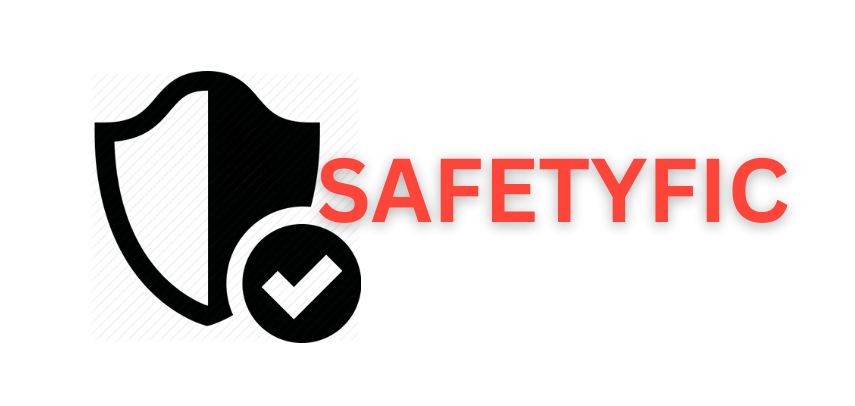Securing a trailer in your driveway is not just about preventing theft; it’s also about ensuring safety and peace of mind. Whether you use your trailer for hauling equipment, camping adventures, or any other purpose, properly securing it when not in use is crucial.
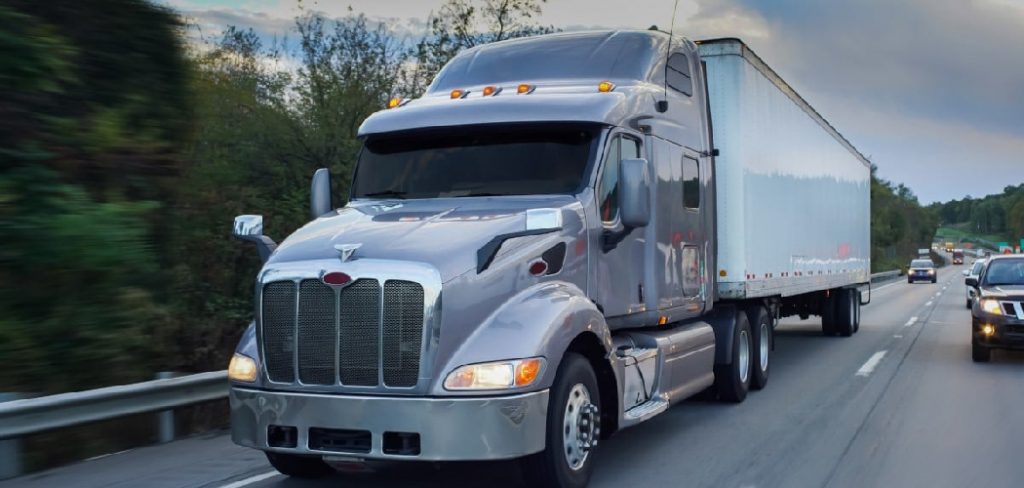
From preventing unauthorized access to safeguarding against accidents caused by unexpected movement, taking the necessary precautions can save you from potential headaches down the road. In this article, we’ll explore a range of methods and tips for how to secure trailer in driveway.
From using locks and wheel chocks to employing hitch locks and security cameras, we’ll cover both basic and advanced strategies to help you keep your trailer safe and sound. So, whether you’re a seasoned trailer owner or a novice looking to protect your investment, read on to discover the best practices for securing your trailer and ensuring peace of mind when it’s parked at home.
The Importance of Securing Trailers in Driveways
One might wonder why securing a trailer in a driveway demands attention. The answer lies in both the value of the trailer itself and the contents it may hold. Trailers, by their nature, are easily transportable, which makes them an attractive target for theft. A trailer left unsecured is not just at risk of being stolen but also poses a potential threat of being tampered with, which could lead to accidents or damage.
Furthermore, trailers often carry valuable or essential goods — from lawn equipment and tools to recreational vehicles and personal items. The loss or damage of these items can lead to significant financial and emotional distress. Beyond the risk of theft and damage, an unsecured trailer can also become a liability, potentially leading to accidents that could harm people or property.
In essence, taking steps to secure your trailer effectively mitigates these risks, safeguarding your assets, ensuring community safety, and providing you with peace of mind.
Assessing Your Trailer and Driveway
Before implementing any security measures, it’s critical to assess both your trailer and the driveway it occupies. This initial step allows you to tailor security strategies effectively, ensuring that you address specific vulnerabilities. Begin by evaluating the size and type of your trailer, as larger trailers may require more robust security measures due to their visibility and value.
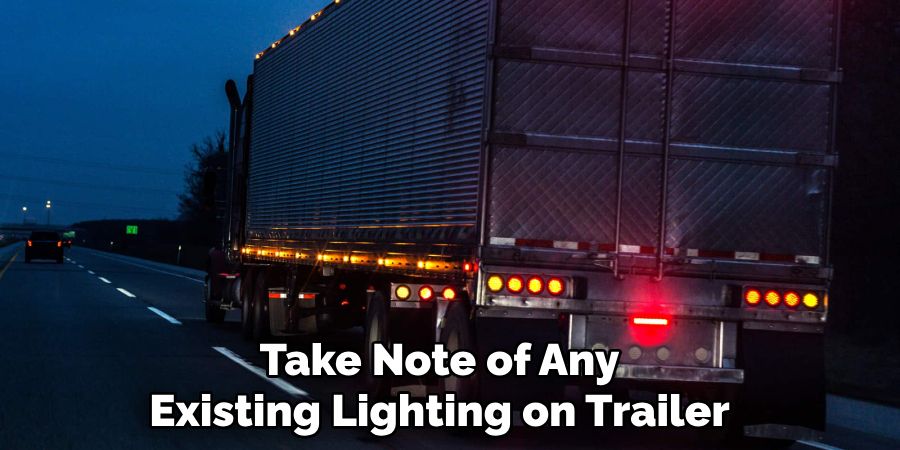
Consider the contents you typically haul, as high-value items may necessitate additional layers of security. Next, assess the layout and location of your driveway. Is it visible from the street, or more secluded? Driveways with less visibility from public areas may be at higher risk for attempted thefts due to the reduced chance of a thief being spotted.
Take note of any existing lighting or natural surveillance opportunities, such as windows from your home that overlook the driveway. Lighting can be a deterrent to potential thieves, while natural surveillance provides you and your neighbors with the chance to observe any suspicious activities.
Finally, evaluate the current state of your driveway’s surface. A stable and level surface can contribute to the effectiveness of certain security devices, such as wheel chocks or grounding anchors. If your driveway is gravel or uneven, some security measures might be less effective or require adaptation to ensure they provide the intended level of protection.
By conducting a thorough assessment of both your trailer and the driveway, you’ll be better prepared to choose and implement security measures that offer comprehensive protection against theft, tampering, and accidental movement.
Understanding the Risks of Trailer Theft and Vandalism
Understanding the risks associated with trailer theft and vandalism is essential for any trailer owner. These risks extend beyond the mere loss of the trailer itself to encompass potential damage to your property and the loss of valuable or irreplaceable contents stored within the trailer.
Thieves target trailers because they can be quickly hitched to a vehicle and towed away, often in a matter of minutes. This makes them particularly vulnerable, especially when left unsecured in areas with low visibility or minimal security presence.
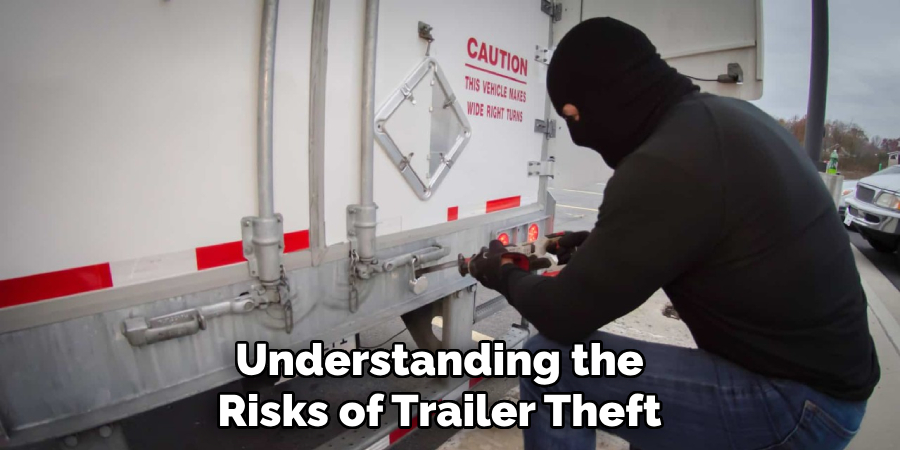
Vandalism presents another risk, with perpetrators potentially causing significant damage to your trailer out of malice or in an attempt to access locked contents. Such acts can lead to costly repairs and downtime, especially if the trailer is used for business purposes or scheduled activities.
The impact of theft and vandalism goes beyond the immediate financial loss. It can include the hassle of dealing with insurance claims, possible increases in premiums, and the emotional distress associated with losing items of personal or sentimental value. Furthermore, the presence of an unsecured trailer can also attract criminal activity to your neighborhood, affecting the overall safety and security of your community.
In conclusion, understanding these risks is the first step towards mitigating them. By acknowledging the potential threats to your trailer, you can adopt more effective measures to secure it, thereby protecting your investment and contributing to a safer environment for everyone.
Evaluating Your Trailer’s Size, Weight, and Storage Needs
An integral part of ensuring the security of your trailer involves a careful evaluation of its size, weight, and storage requirements. The size of your trailer directly influences the type of security devices and strategies you’ll need to employ.
Smaller trailers might be more susceptible to theft since they can be easily hooked up to a vehicle and towed away or even manually moved by a group of individuals. In contrast, larger trailers, due to their size and weight, may deter quick theft attempts but will require stronger, more durable locks and possibly additional security measures like wheel clamps or ground anchors to effectively anchor them in place.
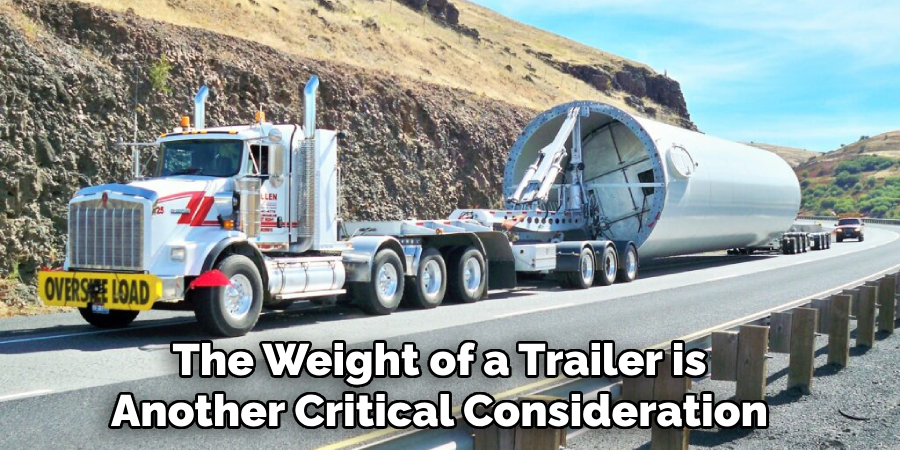
The weight of your trailer is another critical consideration. Heavier trailers, especially those used for commercial purposes or for transporting heavy equipment, not only need stronger locks but might also benefit from electronic monitoring systems that can alert you in case of unauthorized movement.
Lastly, considering the storage needs of your trailer is essential. If your trailer is used to transport valuable goods, personal items, or equipment susceptible to theft, implementing layered security measures becomes imperative. This might include locked storage compartments within the trailer, high-quality padlocks, and perhaps a security system with motion sensors and cameras to monitor the interior and exterior of the trailer.
By carefully evaluating these aspects – size, weight, and storage needs – you can ensure that you select the most appropriate and effective security solutions that provide comprehensive protection against theft, tampering, and vandalism. This not only helps in safeguarding your property but also in ensuring that the trailer remains functional and secure for its intended use.
Choosing the Right Security Measures
After assessing the risks and thoroughly evaluating your trailer’s characteristics, the next critical step is choosing the right security measures. This decision should be guided by a balance of effectiveness, convenience, and cost. For starters, consider basic deterrents like high-quality padlocks, hitch locks, and wheel clamps, which can make your trailer less attractive to thieves.
For higher levels of security, especially for trailers that store valuable items or are left unattended for prolonged periods, more sophisticated options like alarm systems and GPS trackers might be warranted. These devices can alert you to potential thefts in real time and help in the recovery of a stolen trailer.
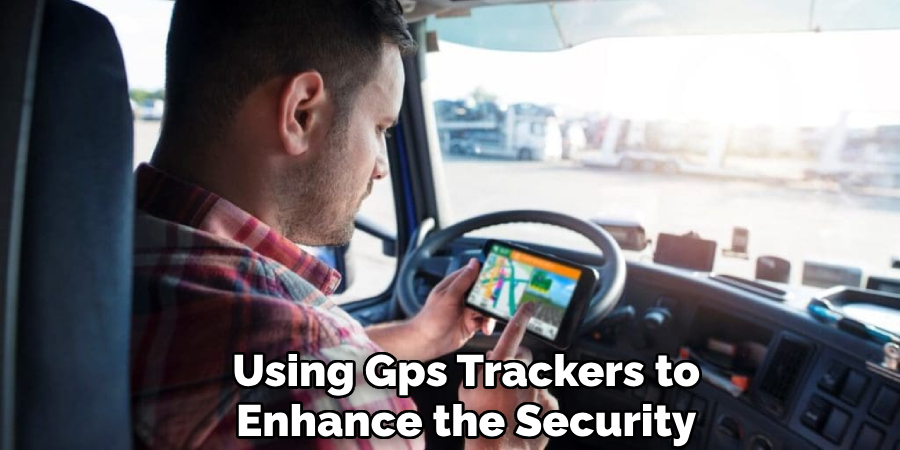
Additionally, explore the possibility of using motion-activated lights and security cameras to enhance the security of the area where the trailer is parked. Not only do these measures deter potential thieves, but they can also provide valuable evidence in the event of theft or vandalism.
Remember, the effectiveness of these security measures often depends on their correct installation and use. Therefore, it’s vital to follow the manufacturer’s guidelines or consult with a professional to ensure optimal functionality.
By carefully selecting and properly implementing a combination of these security measures, you can significantly reduce the risk of theft and vandalism, providing peace of mind and ensuring the safety of your trailer and its contents.
Wheel Locks and Chocks
Wheel locks and chocks play an essential role in preventing the unauthorized movement of your trailer, serving as both a practical security measure and a deterrent against theft.
Wheel locks, also known as wheel clamps, encase the wheel, making it impossible for the trailer to be towed away without removal of the lock. These devices are highly visible, serving as a clear sign to potential thieves that your trailer is securely protected.
Chocks, on the other hand, are placed under the wheels to prevent rolling. While typically used for safety and stabilization, when combined with wheel locks, chocks add an extra layer of security. They are particularly effective for trailers stored on inclines or in varied terrains where movement might be easier.
Selecting the right wheel lock involves considering the size and type of your trailer’s wheels, as well as the level of security you require. It’s worth investing in high-quality locks made of robust materials resistant to tampering and cutting. Similarly, choosing chocks that suit the specific needs of your trailer, such as the weight and the surface it’s parked on, ensures they effectively contribute to the overall security strategy.
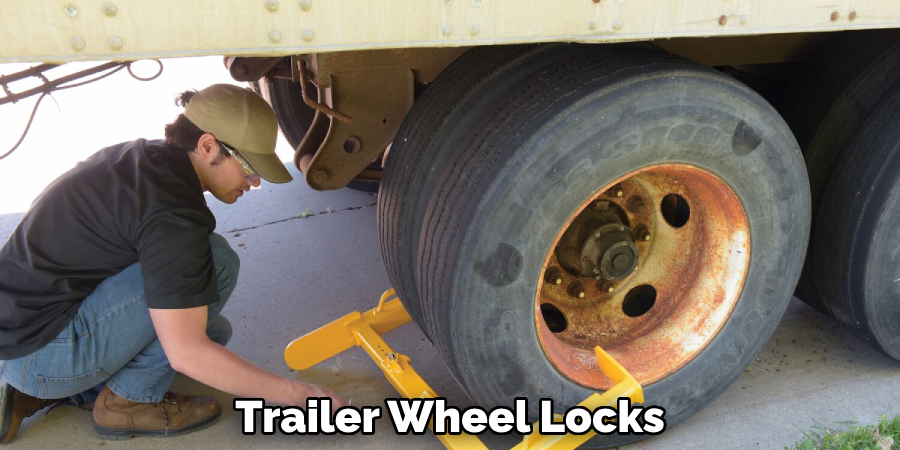
Together, wheel locks and chocks form a formidable first line of defense, making them indispensable tools in safeguarding your trailer against theft and accidental movement. Implementing these devices in conjunction with other security measures further enhances the protection of your trailer, providing you with greater peace of mind.
Factors to Consider When Selecting Security Devices
When it comes to selecting the right security devices for your trailer, several crucial factors must be taken into account to ensure optimal protection. First and foremost, the level of risk associated with your particular situation should guide your choices.
Trailers parked in high-risk areas or those used to transport particularly valuable items may require more sophisticated security measures, such as advanced locking systems or electronic monitoring.
The compatibility of security devices with your trailer is another important consideration. Ensure that the devices you choose can be properly installed on your trailer without causing damage or hindering its functionality. For example, the size and design of wheel locks and clamps must be suitable for the specific wheels of your trailer.
Durability is also key. Security devices will be exposed to various weather conditions and potential tampering efforts, so opting for devices made from high-grade, weather-resistant materials is crucial for long-term effectiveness.
Ease of use is another factor that should not be overlooked. If a security device is overly complicated or time-consuming to engage and disengage, you might find yourself less inclined to use it consistently. Therefore, seek out devices that offer a balance between strong security features and user convenience.
Lastly, consider the cost-effectiveness of the security devices. Investing in the highest-quality security measures you can afford is advisable, but it’s also important to assess the value they offer in relation to their price. Sometimes, a combination of basic and advanced security measures can provide comprehensive protection without breaking the bank.
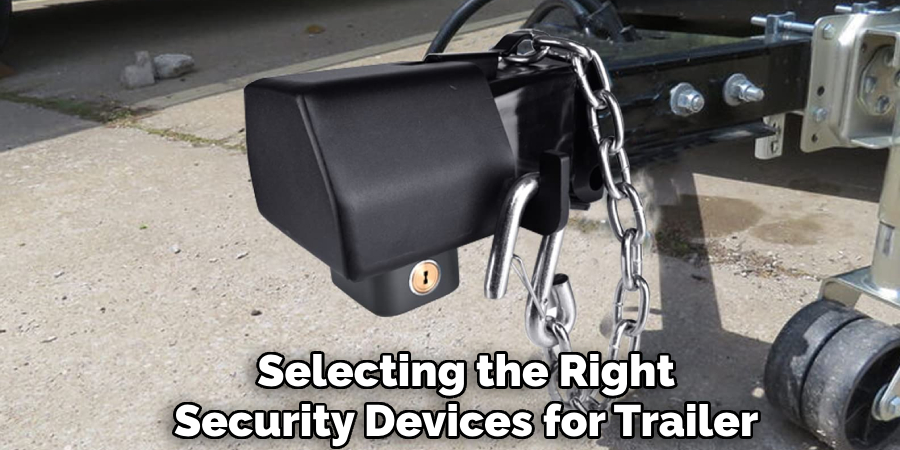
10 Methods How to Secure Trailer in Driveway
1.Utilize a Trailer Hitch Lock:
A trailer hitch lock is a simple yet effective device that prevents unauthorized access to your trailer. It attaches to the trailer hitch, making it difficult for thieves to hitch it to their vehicle. Choose a high-quality hitch lock with a robust locking mechanism and ensure it fits securely onto your trailer hitch.
2.Invest in Wheel Locks and Chocks:
Wheel locks and chocks are designed to prevent your trailer from rolling or being towed away. Place wheel chocks in front of and behind the trailer tires to prevent movement, and use wheel locks to secure the wheels in place. Opt for heavy-duty wheel locks made of durable materials to deter theft attempts effectively.
3.Install a Coupler Lock:
A coupler lock is specifically designed to secure the trailer coupler, preventing it from being attached to a towing vehicle. It fits over the coupler and is locked into place, making it nearly impossible for thieves to hitch the trailer without the key. Choose a coupler lock that is compatible with your trailer’s coupler size and type for optimal security.
4.Secure the Trailer Tongue:
The trailer tongue is vulnerable to theft if left unprotected. Consider using a tongue lock or tongue ball lock to immobilize the trailer tongue and prevent it from being hitched to another vehicle. Ensure that the lock is securely fastened and cannot be easily tampered with or removed.
5.Implement Security Cables or Chains:
Security cables or chains provide an additional layer of protection for your trailer. Secure one end of the cable or chain to a fixed object, such as a sturdy post or anchor point, and loop the other end around the trailer frame or axle. Use a high-quality padlock to secure the cable or chain in place, making it difficult for thieves to steal the trailer.
6.Park in a Well-Lit Area:
Parking your trailer in a well-lit area can deter thieves and vandals by increasing visibility and reducing the likelihood of unauthorized access. Install outdoor lights or motion-activated security lights in your driveway to illuminate the area where the trailer is parked. Adequate lighting can make your trailer less attractive to potential thieves and enhance overall security.
7.Install Surveillance Cameras:
Surveillance cameras provide continuous monitoring of your trailer and driveway, allowing you to keep an eye on your property remotely. Install security cameras with motion detection capabilities to capture any suspicious activity or unauthorized access. Place cameras strategically to cover key areas of your driveway and trailer storage area for maximum surveillance coverage.
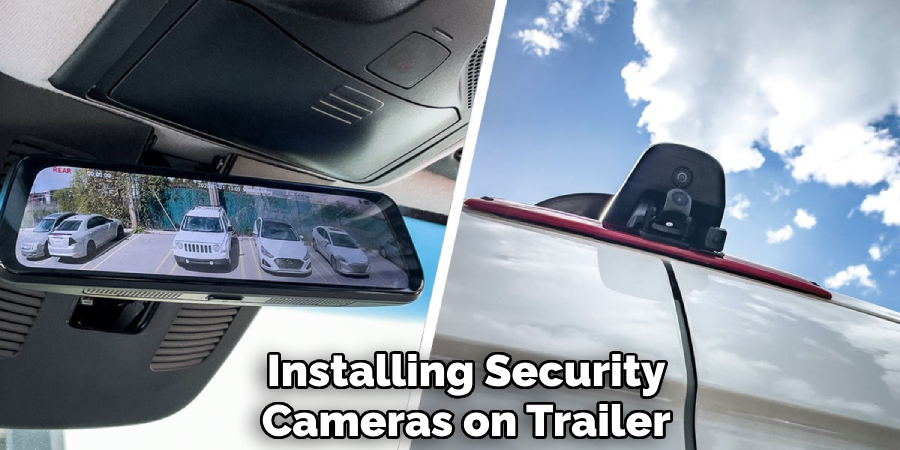
8.Join Neighborhood Watch Programs:
Participating in neighborhood watch programs can enhance security in your community and deter criminal activity, including trailer theft. Stay connected with your neighbors and report any suspicious behavior or incidents promptly. Collaborating with local law enforcement and community members can help prevent trailer theft and promote a safer environment for everyone.
9.Use GPS Tracking Devices:
GPS tracking devices can be installed on your trailer to monitor its location in real-time and track its movements remotely. In the event of theft, a GPS tracker can help law enforcement authorities locate and recover your stolen trailer quickly. Choose a GPS tracking device with reliable coverage and features such as geofencing and tamper alerts for added security.
10.Employ Visible Deterrents:
Visible deterrents, such as warning signs, decals, and security stickers, can discourage thieves from targeting your trailer. Display signs indicating that the premises are monitored by security cameras or protected by an alarm system. Place stickers or decals on your trailer windows or exterior to alert potential thieves that security measures are in place, deterring theft attempts.
Conclusion
Securing a trailer in your driveway is not just about preventing theft; it’s also about ensuring safety and peace of mind. Whether you use your trailer for hauling equipment, camping adventures, or any other purpose, properly securing it when not in use is crucial.
From preventing unauthorized access to safeguarding against accidents caused by unexpected movement, taking the necessary precautions can save you from potential headaches down the road. In this article, we’ll explore a range of methods and tips for effectively securing your trailer in your driveway.
Thanks for reading, and we hope this has given you some inspiration on how to secure trailer in driveway!
About
Safety Fic is a distinguished figure in the world of Diy design, with a decade of expertise creating innovative and sustainable Diy solutions. His professional focus lies in merging traditional craftsmanship with modern manufacturing techniques, fostering designs that are both practical and environmentally conscious. As the author of diy, Safety Fic delves into the art and science of Safety Fic-making, inspiring artisans and industry professionals alike.
Education RMIT University
(Melbourne, Australia) Associate Degree in Design (Safety Fic) Focus on sustainable design, industry-driven projects, and practical craftsmanship. Gained hands-on experience with traditional and digital manufacturing tools, such as CAD and CNC software.
Nottingham Trent University
(United Kingdom) Bachelor’s in diyfastly.com and Product Design (Honors) Specialized in product design with a focus on blending creativity with production techniques. Participated in industry projects, working with companies like John Lewis and Vitsoe to gain real-world insights.
Publications and Impact
In diy, Safety Fic his insights on indoor design processes, materials, and strategies for efficient production. His writing bridges the gap between artisan knowledge and modern industry needs, making it a must-read for both budding designers and seasoned professionals.
